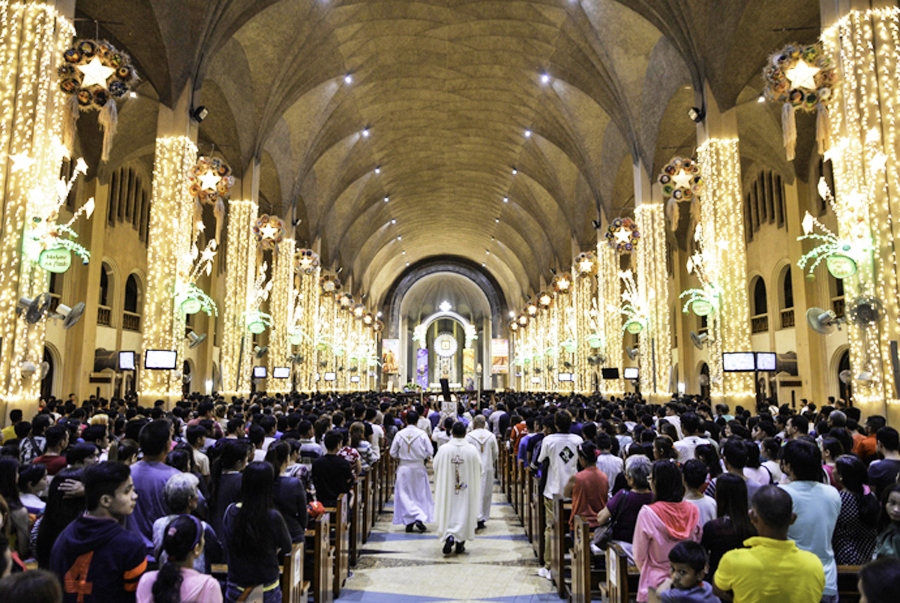Fr Leonard E Dollentas
Joining the Mass on “Simbang Gabi” (night Mass) or “Misa de Gallo” (Mass of the Rooster or dawn Mass) for nine consecutive days is one of the most distinctive traditions of the Filipinos during Christmas. From December 16 to 24, Filipinos in Macau will be trooping uphill to San Augustine Church to join the 5:30 AM Misa de Gallo. Though the custom always evokes joy, there is also a hint of sadnessas many of them have not been home for the last two years due to the pandemic and work restrictions. Simbang Gabi requires every church goer to make an effort to wake up so early in the morning and not to fall asleep during the Mass. It is a moment to pray to God for a healthy life, successful career, stronger family ties, among others.
However, as the days for the Simbang Gabi still fall in the middle of the pandemic, one begins to wonder if Filipinos in Macau still have time to observe this tradition without being worried. It is encouraging to note that most Filipino Catholics, not only in Macau but those in other countries, still attend Simbang Gabi despite COVID 19 concerns and their busy schedules. They believe that completing the nine Masses will bring down blessings on them.
Last Sunday, after the Simbang Gabi schedule was announced we asked some churchgoers about their sentiments on this most cherished Filipino Catholic tradition. Cherry Bolipayo, a domestic worker in Macau, said her wish to work abroad was granted after she was able to almost complete attendance in the nine-day Masses: “Before I worked in Macau, I always attend the Simbang Gabi in our parish in Bicol (in Southeastern Luzon) even though I’m tired from job hunting. Although I missed one Mass, my wish was granted a year after that,” Bolipayo said.
Other churchgoers, though, believe that attending Simbang Gabi is not about fulfilling wishes, but it’s part of their family tradition and faith in God. A lay minister of Communion who serves in the Cathedral said: “Simbang Gabi is part of our family tradition and our faith in God. We always have time for God no matter how busy we are. If there’s a will, there’s a way. For us working in the hotels, even though we are busy, we have time to attend the Simbang Gabi after work.”
Besides St Augustine Church, Macau Cathedral also opens its doors to churchgoers joining Simbang Gabi from December 15-23 at 8:30 PM. Our Lady of Fatima Church will also hold its own on the same dates at 9:30 PM. The Simbang Gabi at the Cathedral and at the Fatima Church are scheduled to accommodate migrant workers who may complete their work duty late in the evening.
THE RORATE MASSES
The Simbang Gabi was not actually conceived in the Philippines. It traces its roots to the so-called Rorate Masses in Europe that date back to the 8th century, when there was a custom of celebrating Masses in honor of our Lady in the time of Advent. These Masses were called “Rorate Masses” because the entrance antiphon began with the words “Rorate caeli désuper et nubes pluant justum” (“Drop down dew, ye heavens, from above, and let the clouds rain the just”).
There were many ways of celebrating the Rorate Masses (see Wikipedia article “Rorate caeli”). One of them involved celebrating Mass on the nine consecutive days prior to Christmas (Celebratio novendialis Missarum aurearum, “A Novena of Golden Masses”). The Sacred Congregation of Rites permitted this in some dioceses in Italy in 1658, 1713, and 1718.
Fr Virgilio B Hernandez of the Federation of Tagalog Diocesan Liturgical Commissions explains in “Simbang Gabi,” an article on how the Rorate Masses were adapted to the Church in the Philippines. “From the historical perspective, the First Plenary Council of the Philippines, in 1953, applied for a papal indult under the following conditions: ‘On the nine days preceding the Nativity of our Lord, i.e., from December 16 to 24, the solemn votive Mass Rorate Coeli Desuper is sung especially in parish and convent churches, but only once a day with great solemnity and with a big attendance of the faithful.’
“With the promulgation of the 1960 Code of Rubrics, the Philippine Hierarchy, under its president Archbishop Julio Rosales of Cebu, wasted no time and decided to elevate in the same year to the Holy Father a suppliant letter ‘humbly asking that, in spite of the promulgation of the new Code of Rubrics, and for as long as the same grave reason, namely the conservation of the Faith [in the Philippines] continued, the Aguinaldo Masses be allowed to be sung for nine days preceding the Nativity.’
“On 24 March 1961, the petition was granted for a period of five years. Until today, the Philippine Church continues to cling strongly to centuries-old tradition of celebrating the ‘Aguinaldo Masses,’ with undiminished attendance and festive joy, for the same reasons adduced in ancient times, but with some changes and trends caused by the changing lifestyle and circumstances in our society. We refer to the time and places of their celebration. Some Masses are now being celebrated in the evening, and not only in churches and chapels, but also in malls and commercial centers.”
In the same article (https://sites.google.com/site/tagalogliturgy/mga-direktiba/on-simbang-gabi), Fr Hernandez gives some guidelines on how the Masses are to be celebrated.
(Photo: tempo.com.ph)


 Follow
Follow


